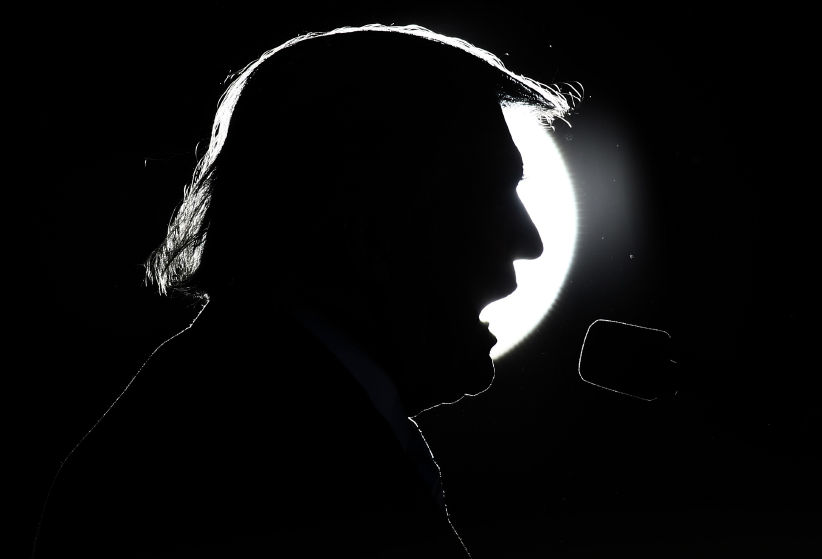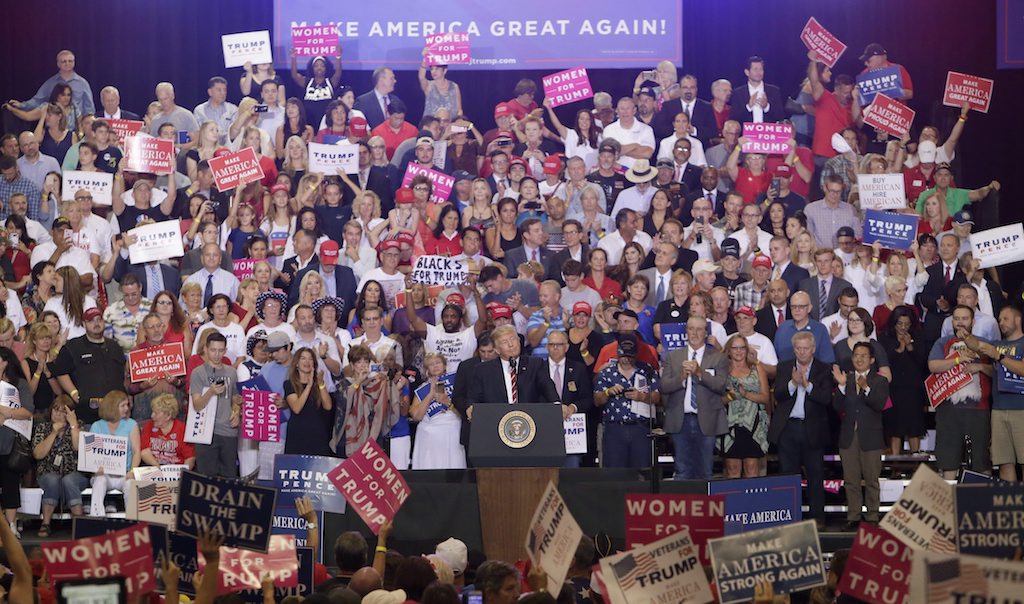Trump says he’ll ‘probably’ terminate NAFTA
“Personally, I don’t think we can make a deal,” Trump says at rally in Phoenix – one week after NAFTA talks begin
Republican presidential candidate Donald Trump delivers remarks while campaigning at Regent University October 22, 2016 in Virginia Beach, Virginia. (Win McNamee/Getty Images)
Share

WASHINGTON – Donald Trump has threatened to blow up NAFTA less than one week into the renegotiation of the trade agreement, providing an early indication that the upcoming talks might occur under a cloud of menace.
The president’s threat itself is no surprise. A common topic of hallway chatter at last week’s first round of talks last week was just when he might deploy that withdrawal threat, which many view as his principal source of negotiating leverage.
The only surprise is how quickly it came.
“Personally, I don’t think we can make a deal,” Trump told a campaign-style rally in Arizona late Tuesday night. “Because we have been so badly taken advantage of. They have made such great deals – both of the countries, but in particular Mexico – that I don’t think we can make a deal.
“So I think we’ll end up probably terminating NAFTA at some point.”
He repeated it: “I told you from the first day, we will renegotiate NAFTA or we will terminate NAFTA. I personally don’t think you can make a deal without termination but we’ll see what happens. You’re in good hands, I can tell you.”
He’s made the threat numerous times, but this is the first time he’s done it since Canada, the U.S. and Mexico began talks last week.
Mexico’s foreign minister shrugged it off as a leverage play: “No surprise: we’re in a negotiation,” Luis Videgaray tweeted in response. “Mexico will remain at the table with calmness, firmness, and in the national interest.”
Insiders say they expect him to keep making these threats. It’s his main source of power to force the other countries to reach an agreement. One well-connected Washington lobbyist at last week’s talks said he was convinced the threat was coming: “Almost 100 per cent.”
The former deputy trade czar under Barack Obama said it’s an obvious move and he thinks the president made it too early. In an interview several weeks ago, Robert Holleyman said it was a serious tactical error when Trump made the threat in April.
He said Canada and Mexico gained valuable insight that will render Trump’s threats less powerful at the negotiating table: in April, the U.S. Congress pushed back against him, the business community fumed, and his own cabinet members pleaded against it.
”It was, at a minimum, terrible timing,” said Holleyman, Obama’s deputy United States Trade Representative.
”You do that at the 11th hour in the negotiation _ not at the throat-clearing stage … I suspect President Trump will be unable to play that card again. And if he does play it, it won’t be as strong as it would’ve been… The Canadians and Mexicans will say, ‘You… will face a huge backlash in your own Congress.”’

That episode in April underscored the complexity of ending NAFTA.
Without the support of Congress, a president might withdraw the U.S. from the international agreement, but he could not singlehandedly wave away the law on the U.S. books that implemented NAFTA.
An international economic law professor and former State Department lawyer said he believes it would ultimately end up in court. And he said U.S. courts would ultimately conclude that the president can’t rip up NAFTA without congressional support.
That’s because the president can’t just erase the 1994 NAFTA Implementation Act passed by Congress. Only Congress can pass laws. In addition, the U.S. Constitution makes clear that Congress has power over international commerce.
“If the president were to rip up NAFTA, and then sort of jack tariffs way up, I think somebody would be able to come in and say… ‘You’re actually violating U.S. domestic law,”’ said Tim Meyer, a Vanderbilt professor, former government lawyer, and onetime clerk for Neil Gorsuch, whom Trump appointed to the Supreme Court.
“I think courts are going to be sympathetic to the idea that the president can’t ignore the legislation that implements these trade agreements. Congress has not repealed that legislation, and they’ve given no indication they intend to.”
That being said, several observers suggest a presidential attempt to withdraw could set up a legal and political tug of war with Congress over the setting of new tariff schedules – and that would foster economic uncertainty.
MORE ABOUT NAFTA:
- NAFTA: What each country wants out of a new deal
- NAFTA chapter on Indigenous rights crucial, AFN national chief says
- NAFTA: A brief history
- ‘Great deal’ of work still to go as first round of NAFTA talks end
- Auto sector quickly emerges as key to NAFTA talks
- Robert Lighthizer’s aggressive opening stance on NAFTA